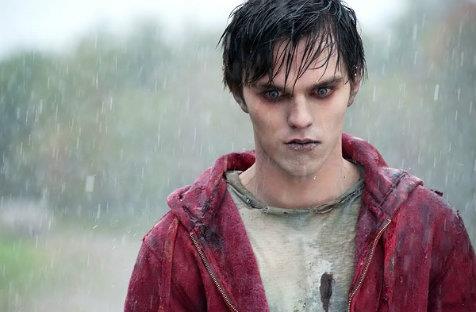Audiences like their zombies mindless, flesh-hungry, and at odds with human existence, as well as in plentiful supply. With the genre’s popularity surging, the insatiable appetite for undead adventures mirrors the ravenous hunger of the shuffling masses; however with very rare exceptions, standard cinematic depictions still apply. Warm Bodies refreshingly adheres to and deviates from the norm, populating its frames with the expected zombie archetype, yet showing room for growth beyond their standard form. Influenced by classical romance as well as horror conventions, the adaptation of Isaac Marion’s novel of the same name traverses familiar and atypical territory.
In his fourth film after All the Boys Love Mandy Lane, The Wackness and 50/50, writer/director Jonathan Levine doesn’t discard all that viewers know and love about the gluttonous undead, nor does he shy away from appropriating elements of non-zombie content. His own varied resume – flitting between slasher thrills, coming-of-age irreverence and cancer comedy thus far – also informs the direction and tone of the subsequent feature, with Warm Bodies merging horror, humour and faltering human bodies into a charming assemblage of customary tropes, textual homages and creative directions.
Protagonist R (Nicholas Hoult, Jack the Giant Slayer) hails from the hordes of walking corpses prominent in a dystopian future. Far from the usual unresponsive drone, R is aware and abhorrent of his status, but unable to change. Instead, he relishes salvaged records, grunt-based conversations with fellow zombie M (Rob Corddry, TV’s Children’s Hospital), and the rush of memories that accompanies his usual sustenance of brains. A chance meeting with human survivor Julie (Teresa Palmer, Wish You Were Here) further fuels his desire for emotions and experiences, as affection blossoms in the unlikeliest of circumstances.
Thankfully, the energetic Warm Bodies isn’t just another vacuous attempt to cash in on the paranormal romance trend, or a paint-by-numbers post-apocalyptic zombie offering. Marion’s novel and Levine’s corresponding screenplay grounds the pairing in the inner workings of its narrative to impressive effect, justifying the additions to mythology, humanising characters alive and not so, and engaging the audience in the process. Shakespearian allusions are evident but not overbearing, with the sympathetic monster of Mary Shelley’s Frankenstein also an influence. The perfect bittersweet mood accompanies the combination, cultivating an endearingly offbeat blend of empathy and amusement.
The cannily contemplative core of the feature also sets it apart, further fuelling its appeal. At the heart of R and Jules’ interactions and Hoult and Palmer’s performances is a consideration of what it means to be human in modern times; the observations prove probing and poignant, even when given horrific and comedic interpretations. While such considerations aren’t new in horror, Warm Bodies’ witty handling of existential adolescent angst – as expressed in the film’s insightful narration – is thoughtful and tender. A zom-rom-com truly is the end result, in an effort that epitomises the best of the combined genres.
Rating: 4 stars out of 5
Warm Bodies
Director: Jonathan Levine
USA, 2013, 98 min
Release date: April 11
Distributor: Icon Films
Rated M
Actors:
Director:
Format:
Country:
Release:





